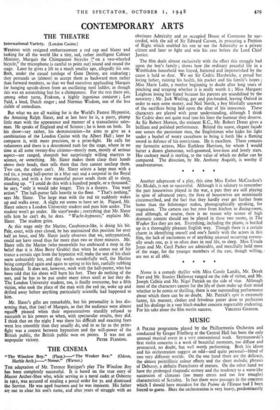THE CINEMA
"The Winslow Boy." (Plaza.)—'The Weaker Sex." (Odeon, Marble Arch.)—" Noose." (Warner.) THE adaptation of Mr. Terence Rattigan'S play The Winslow Boy has been completely successful. It is based on the true story of Master Archer-Shee who, while serving as a naval cadet at Osborne in 1911, was accused of stealing a postal order for 5s. and dismissed the Service. He was aged fourteen and he was innocent. His father set out to clear his son's name, and after- years. of struggle with an
obstinate Admiralty and an occupied House of Commons he suc- ceeded, with the aid of Sir Edward Carson, in procuring a Petition of Right which enabled his son to sue the Admiralty as a private citizen and later to fight and win his case before the Lord Chief Justice.
The film deals almost exclusively with the effect this struggle had upon the boy's family ; shows how the ordinary peaceful life in a Wimbledon household was frayed, battered and impoverished by the cause it held so dear. We see Sir Cedric Hardwicke, a proud but loving father, ruining his health, his pocket and his family's hopes ; Miss Marie Lohr, a mother beginning to doubt after long years of pinching and scraping whether it is really worth it ; Miss Margaret Leighton losing her fiancé because his parents are scandalised by the notoriety ; Mr. Jack Watling, gay and pin-headed, leaving Oxford in order to earn some money, and Neil North, a boy blissfully unaware of the sacrifices being laid upon the altar of his innocence. These characters are played with great understanding, although I think Sir Cedric does not quite read into his lines the humour they deserve. As Sir Robert Morton, the eminent K.C., Mr. Robert Donat gives a brilliant and polished performance. Behind the suave, elegant facade one senses the passionate man, the Englishman who hides his light under a bushel of weary casualness to bring it forth like a flaming sword in defence of his convictions. He is excellent. There remains my favourite actress, Miss Kathleen Harrison, for whom I would barter a dozen glamorous, well-groomed, love-lorn and lovely stars. Her cockney maid is sterling, to the value of which no dollar can be compared. The direction, by Mr. Anthony Asquith, is worthy if unadventurous.
Another adaptation of a play, this time Miss Esther McCracken's No Medals, is not so successful. Although it is salutary to remember the part housewives played in the war, a part they are still playing in spite of advanced years, the lives of housewives are notoriously circumscribed, and the fact that they hardly ever get further from home than the fishmonger makes, photographically speaking, for stagnation. The camera can but rove from kitchen to dining-room, and although, of course, there is no reason why scenes of high dramatic content should not be played in these two rooms, in The Weaker Sex they are not. Everything, including the plums, is bottled up in a thoroughly pleasant English way. Though there is a certain charm in identifying oneself and one's family with the actors in this film, the lack of excitement or of anything unusual occurring eventu- ally sends one, as it so often does in real life, to sleep. Miss Ursula Jeans and Mr. Cecil Parker are admirable, and mercifully hold most of the stage, for the younger members of the cast, though willing, • are not at all able.
Noose is a comedy thriller with Miss Carole Landis, Mr. Derek Farr and Mr. Stanley Holloway ranged on the side of virtue, and Mr. Joseph Calleia and Mr. Nigel Patrick on the side of vice. Although most of the characters cannot for the life of them make up their mind whether to be comic or thrilling, there is one outstanding performance about which there can be no doubt. Mr. Patrick's spiv is extremely funny, his manner, clothes and frivolous patter done to perfection and his dealings in a vast black-market concern regrettably endearing.
For his sake alone the-film merits success. VIRGINIA GRAHAM.


































 Previous page
Previous page